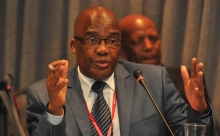Healthcare in South Africa - #NoToXenophobia

Speaking at a meeting of the National Educational Health and Allied Workers Union (NEHAWU) last week, the South African Health Minister, Mr Aaron Motsoaledi said the country’s health system is overburdened by foreigners. This is a dangerous playing up of the xenophobic card, to deflect attention from the major challenges facing public healthcare delivery: inadequate funding; poor governance, and sharp social inequality which reinforces health inequity.
Public Services International defends access to quality healthcare services as a fundamental human right. Human rights cannot be reduced to the citizenship status of persons. Over the years, South Africa has been a leading voice in Africa and globally, in calling for “Health for All”. The statement by Mr Motsoaledi is thus a step backwards, which should be frowned at.
As noted by Shenilla Mohamed, Executive Director of Amnesty International South Africa, Mr Mostoaledi is trying to scapegoat migrants instead of taking urgent steps to improve access to affordable and quality health care for all persons in South Africa. This is a demonstration of contempt for several international covenants the South African government has signed, including the International Covenant on Economic, Social and Cultural Rights, the Convention on the Elimination of All Forms of Discrimination Against Women and the Convention on the Rights of the Child.
The South African deputy public protector, Mr Kelvin Malunga, rightly pointed out that the health minister made “a desperate statement after failing to address the systemic issues” confronting public health.
It is particularly worrisome that the minister of health made this statement at a time that the South African government is in the process of fashioning out a National Health Insurance (NHI) scheme. The gazetted National Health Insurance Bill limits the rights of refugees and asylum seekers to: emergency health care services; services for notifiable conditions of public health concern and; paediatric and maternal services at primary health care level. Undocumented migrants are excluded from any form of care under the Bill, reflecting the mindset expressed by Mr Motsoaledi.
PSI submitted a memorandum addressing this and other salient issues in the NHI Bill. A key marker of the realisation of the right to health is universality of access to health services. This requires the strengthening of public healthcare delivery and not discrimination against migrants, many of whom contribute significantly to the growth and development of the South African economy.

